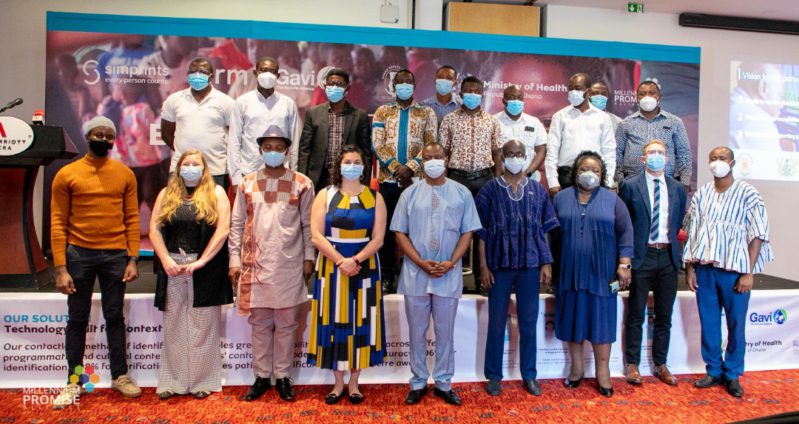The Ghana Health Service (GHS) has partnered with Gavi and Arm to embark on a biometric-based routine immunisation program in the Eastern Region from October 2021.
This is the first national vaccination scheme in the country to use biometrics technology, provided by Simprints.
Simprints is a non-profit technology company committed to transforming the way the world fights poverty.
They build technology to radically increase transparency and effectiveness in global development, making sure that every vaccine, every dollar, every public good reaches the people who need them most.
The Gavi-Arm-Simprints strategic partnership is positioned to provide a unique, privacy-first, digital identification system that will support ongoing maternal and child healthcare programs–inclusive of routine vaccinations–as a function of the Ghana Health Service aim for universal health coverage.
The system does not require an existing formal identification document. It uses a biometric method of identification to safely create a unique ID for each individual, allowing health workers in the field to identify patients accurately, and quickly create or access their healthcare record.
The biometric data is securely collected using the health worker’s Android smartphone, while timestamps and GPS coordinates record the time and location of treatment.
Where internet connectivity is poor or non-existent, offline mode can be used to access a previously downloaded database and new patient data is uploaded when connectivity is restored.
This process is fast, eliminates the need for inefficient paper-based tracking of immunization delivery, and allows patients to be linked to their correct medical record even if they forget or lose their physical ID.
Gavi, the vaccine alliance, guides this program with its immunization expertise to administer vaccines, including for COVID-19.
Vitally, Simprints’ solution focuses on the ethical and inclusive use of digital ID, ensuring it works for diverse populations with solid privacy protocols and patient protection at its core.
The system is compatible with the digital health tools used by healthcare workers, governments, and global development practitioners around the world, and can be rapidly deployed and scaled on low-cost Android devices.
Latest Stories
-
One of Nigeria’s richest men buried in Saudi Arabia
2 hours -
Liberian president killed in coup gets state funeral after 45 years
2 hours -
Trump calls for US central bank head to quit immediately
2 hours -
Dozens missing after ferry sinks off Bali
2 hours -
Bank of England to redesign banknotes – and wants your help
2 hours -
Trump announces trade deal with Vietnam
3 hours -
Microsoft to cut up to 9,000 jobs as it invests in AI
3 hours -
Tesla deliveries fall for second quarter in a row
3 hours -
Catherine talks candidly of ‘life-changing’ cancer treatment
3 hours -
Ugandan military helicopter catches fire in deadly Somalia crash
3 hours -
Dramatic moment Sean ‘Diddy’ Combs fell to his knees after learning his fate
4 hours -
2026 NPP Primaries: National Council decision biased, unreasonable – Addai-Nimoh
4 hours -
Qualifier Tarvet impresses but cannot shock Alcaraz
4 hours -
Ghana and India to expand cooperation in trade, agriculture, energy – Mahama
5 hours -
Your visit reaffirms our collective commitment to global peace, prosperity – Mahama tells Narendra Modi
5 hours

